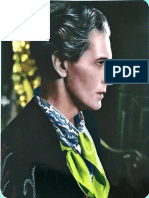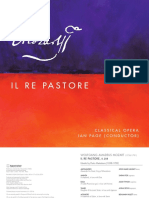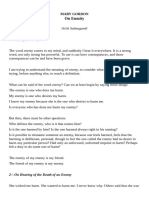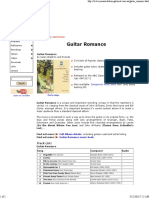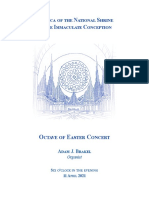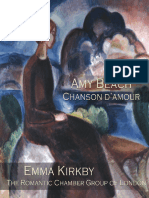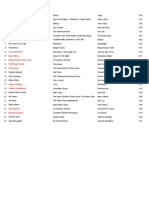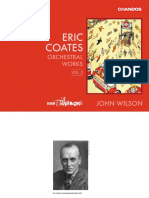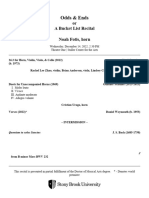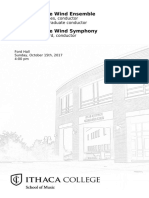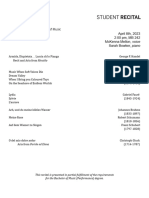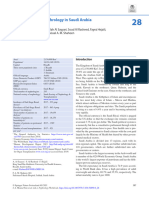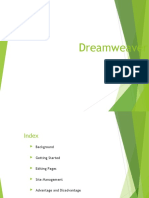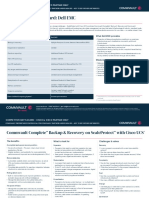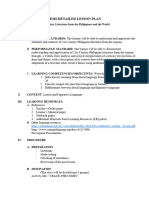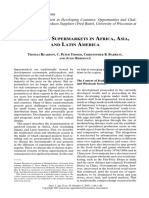NI59831111
NI59831111
Uploaded by
斋藤飞鸟Copyright:
Available Formats
NI59831111
NI59831111
Uploaded by
斋藤飞鸟Original Description:
Copyright
Available Formats
Share this document
Did you find this document useful?
Is this content inappropriate?
Copyright:
Available Formats
NI59831111
NI59831111
Uploaded by
斋藤飞鸟Copyright:
Available Formats
1
Roger Quilter (1877-1953)
Volume 3
Charlotte de Rothschild, soprano Nathan Vale
International O
Nathan Vale, tenor National Oper
Adrian Farmer, piano Nicholas John
Competition w
Oratorio with
Mendelssohn’
Evangelist in
THREE PASTORAL SONGS Op. 22 1920 (Campbell) Laurence Cum
1 I will go with my father a-ploughing 2.09 Handel’s Ode
2 Cherry Valley 2.50 conducted by
3 I Wish and I Wish 2.09 Festival, and M
is a committed
Temple Recita
4 In the bud of the morning-O Op. 25 No. 6 1926 (Stephens) 1.24 Warlock and Ir
5 Music and Moonlight 1935 (Shelley) 2.23 by Finzi, Gurn
6 The Time of Roses Op. 24 No. 5 1928 (Hood) 1.47 included Theo
7 In the Highlands Op. 26 No. 1 1922 (Stevenson) 3.27 Lurcanio Ario
and for Opera
8 Love’s Philosophy Op. 3 No. 1 1905 (Shelley) 1.36 Mr Buchanan
to Snape Malt
9 A Song at Parting pub. 1952 (C. Rossetti) 2.23
10 The Jocund Dance Op. 18 No. 3 1913 (Blake) 1.57 Adrian Farm
11 Now Sleeps the Crimson Petal Op. 3 No. 2 1897 rev. 1904 (Tennyson) 2.31 Manchester fr
encountered N
made the decis
2 NI5983
FROM ‘THE ARNOLD BOOK OF OLD SONGS’ 1921 - 1947
12 Drink to me only with thine eyes (Jonson) 2.23
13 My lady’s garden (Bennett) 3.25
14 Charlie is my darling (Anon.) 1.36
15 Ye Banks and Braes (Burns) 3.08
16 Believe me, if all those endearing young charms (Moore) 2.18
17 My Lady Greensleeves (Irvine) 2.40
18 Over the Mountains (from Percy’s Reliques) 2.13
19 Barbara Allen (Trad.) 3.50
20 Ca’ the Yowes (Burns) 2.25
21 The Jolly Miller (Anon.) 1.58
22 The Ash Grove (Bennett) 2.12
23 The Cradle in Bethlehem 1945 (Bennett) 2.46
24 One Word is too often profaned 1946 (Shelley) 1.30
25 June 1905 (Hopper) 2.26
26 I arise from dreams of thee 1928 (Shelley) 5.14
Total playing time 64.37
Recorded by Nimbus Records at Wyastone Leys, Monmouth UK
19-20 March 2018 (Charlotte de Rothschild) 1-2 August 2019 (Nathan Vale)
Production: Antony Smith and Simon Callaghan
Engineering and Editing: Adrian Farmer
c 2020 Wyastone Estate Limited © 2020 Wyastone Estate Limited
Cover photo : istockphoto.com, Arthurpreston
www.wyastone.co.uk
NI5983 3
Roger Quilter (1877-1952) No man mad
Songs they m
Only Heav'n
The songs on this disc span more than 50 years and show Quilter in all his moods – light,
Father and S
exuberant, ephemeral, narrative, pensive, but always melodic. Few composers – especially song
In a song tha
composers – can claim to have written works that have remained in print since they were first ’Till ages are
published more than a hundred years ago. Roger Quilter is one such, though the number of his
songs still in print is regrettably small: the first two sets of Shakespeare settings, the Seven We sing the
Elizabethan Songs, the Arnold Book of Old Songs, his song-cycle To Julia, and a handful of As they sang
other songs such as ‘Love’s Philosophy’, and some that have been brought back into print – not Soon may th
many, considering that he wrote about 140 songs and arrangements. The fact that some songs That song ag
survive and others fall by the wayside seems all too often to be a matter of chance, but the Praise and g
difficulty of the piano accompaniments (even though invariably pianistic) may be a factor. Good will to
Quilter was a fine pianist, as is evident from the recordings he made, accompanying his own
songs, and although in many of the piano parts he gave no quarter, they are immensely 24 One word i
rewarding to play. (Percy Byss
One word is
Quilter was from a wealthy family – his father, William Cuthbert, made a baronet in the 1897 For me to pr
Diamond Jubilee honours, was a stockbroker and shrewd businessman, with a substantial estate One feeling
at Bawdsey, across the river Deben from Felixstowe in Suffolk. On the one hand, this meant For thee to d
that Roger never had to earn a living and so could write what he chose to: at one time he was One hope is
able to say – with pride – that he could have lived off his earnings. On the other hand, this also For prudenc
meant that there was never any pressure to move out of his comfort zone, and develop in other And pity fro
areas; the one time he did so, in his charming Serenade for small orchestra, he withdrew it after Than that fro
two performances; and so, matching his delight in the beautiful and the small, he composed
exquisite miniatures. Quilter was always ill, certainly with real illnesses, but perhaps I can give no
But wilt tho
exacerbated also by the stress of being homosexual in a world where this was illegal; there are
The worship
rumours that he was blackmailed, too, though these have never been proven. And the Hea
The songs presented here range from one written in 1897 (though not published until 1904, after The desire o
substantial revision) to one published in 1952, the year before he died. Six songs date from the Of the night
1920s, by which time Quilter’s style was mature and confident: the richly coloured harmonies The devotion
of ‘The Time of Roses’ mark a gem too seldom sung. ‘In the Highlands’ is similarly wistful, From the sp
with hints of birdsong, a setting of R.L. Stevenson in reflective mood; it is pentatonic at times,
and Quilter speeds up the harmonic rhythm at points of urgency, the song contrasting with the
4 NI5983
light and dainty ‘In the Bud of the Morning-O’, to words by the Irishman James Stephens. The
singing, Three Pastoral Songs of 1920 (published a year later) are a beautiful group; Quilter
refrain; accompanied Mark Raphael, his main singer after the untimely death of Gervase Elwes, in a
s go winging: recording of ‘Cherry Valley’. The poet Joseph Campbell – his Irish name was Seosamh Mac
e again; Cathmhaoil – maintained correspondence with Quilter over some years, resulting in these
years have taken, settings, originally to be called Cherry Valley: Three Songs. Written for voice and piano trio,
d the word. they were published in that form and also for voice and piano alone; the piano part is the same
awaken:
in both versions, although in Quilter’s recording of ‘Cherry Valley’, he has carefully excluded
g of a bird!
those piano parts that double the violin and cello. These are rose-tinted settings, and none the
there so lightly, less for that. ‘I will go with my father a-ploughing’ is better known in Gurney’s setting, but
dless away, Quilter’s brings out a rhythmic lilting swing in a way that Gurney’s does not. ‘Cherry Valley’
ion so brightly is delicate and detailed, conjuring images of the fairies dancing in the twilight; it leads well into
g of day! ‘I wish and I wish’ which sings along happily.
r I remember, The Pastoral Songs are an unusual group; Quilter usually set songs singly, sometimes collating
to the nest,
them into a set with its own opus number: ‘Love’s Philosophy’ and ‘Now Sleeps the Crimson
ne to December,
rt be at rest.
Petal’ were so assembled, into the Opus 3 set. The former is a setting of Shelley’s well-known
text (set by many composers, including Delius, Gounod and Hovhaness). It is a favourite of
y Bennett) sopranos, but being sung here as a man’s song brings a new and refreshing dimension to it.
‘Now Sleeps’, one of Quilter’s best-known songs, was written in 1897, and for once, since the
manuscript exists, we can see something of Quilter’s compositional process: the introduction is
the conventional exposition of the singer’s opening phrase, but by the time it came to be
published, and almost certainly after he and Elwes had performed it many times, Quilter had
y re-worked the introduction, so that the vocal line emerges as a continuation of it. Quilter revised
the song in 1946, at Mark Raphael’s suggestion, replacing semiquavers at the end, on the words
‘Slip into my bosom’, with a triplet, and with other minor revisions to the piano part. The song
is so familiar that it is easy to forget how descriptive it is: all the musical lines drift downwards,
echoing the words whose imagery is also downward-looking; Quilter omitted the words that
throw the attention skywards.
f tree ‘June’ was set to words by Nora Hopper, who contributed to issues of The Yellow Book, at the
end of the nineteenth century; the song – an early work, published in 1905 – picks up the
ephemeral mood of the text. Quilter’s style is always intensely lyrical, but amidst the colour of
his nostalgic sound are some songs that are cheekier: ‘The Jocund Dance’ was one of four
NI5983 5
Blake settings, a rare setting, for Quilter, of a poet from the eighteenth century. It dates from Do the best th
1913 and its neat rhythms hint at the later ‘Hey, Ho, the Wind and the Rain’, one of the Blind love, if
Shakespeare songs; the flattened sevenths give it an attractive folksong feel. Soon will find
Three songs date from Quilter’s last years. ‘A Cradle in Bethlehem’ was first published in a You may train
book Voices on the Green, in 1945, then as a unison song in 1949, and as a two-part song in To stoop to yo
1950. It slips easily between two and three beats to the bar and its gentle flow is extremely Or you may in
effective in both solo and duet forms. ‘A Song at Parting’, to the familiar words by Christina The phoenix o
Rossetti, is something of an oddity: it lacks the complexity of Quilter’s better songs, and is more The lioness yo
akin in style to his very early work. To get o'er her
But you'll ne'e
The third late song brings us to further settings of Shelley. Shelley’s poetry generally evoked a Love shall fin
very particular sound from Quilter – wayward and iridescent – although ‘One Word is Too
Often Profaned’, which dates from 1946, the time when Quilter’s mental health was 19 Barbara Alle
deteriorating, is unusually simple: it is as if the diatonic, flowing setting is all he can manage. In Scarlet Tow
‘Music and Moonlight’, of 1935, is dreamier, with hints of a guitar being strummed. The superb There was a fa
‘I Arise from Dreams of Thee’ is in a different league. The genesis of the song is unclear – there Made ev'ry yo
are manuscripts for voice and piano dating from 1928 – but whatever its history, the song exists Her name was
in two forms, for voice and piano, and for tenor and orchestra, and in the orchestral form was
performed in the Harrogate Festival of British music in 1929, and sung then by Mark Raphael, All in the mer
though it was really too high for him. This is a large-scale work, a setting of the poem often When green b
called the ‘Indian Serenade’. The perfumed mood suited Quilter perfectly; the setting is rich, Young Jemmy
For love of Ba
yet light, highly chromatic (even by Quilter’s standards), at times claustrophobic, at times
dissolving into thin air; impressionistic, shimmering textures with a disturbed, emotional
Then slowly, s
madness. It is many years since it has been performed in its orchestral form, though it was And slowly sh
popular at one time. And all she sa
Percy Grainger, whom Quilter had met when they were both students, wrote to Quilter that his "Young man, I
folk-song settings were ‘a lovely string of gems, most touching in their humanity & typical of
the heart-revealing skill you have built up of weaving such tune-enhancing arabesques & As she was wa
She heard the
comments round the melody in the accompaniment’ which in typical Grainger style, describes
And ev'ry stro
their essence very effectively. Five were published as single songs in 1921, with various Cried "Woe to
dedicatees, and in the years before the second world war, Quilter used to accompany his nephew
singing them. Arnold Vivian was the youngest child of Quilter’s sister Norah, her ‘Benjamin’
child, as she had him late in life. Arnold was sensitive, musical, a keen gardener (as was
6 NI5983
are Quilter’s mother), and he had a light tenor voice; he was Quilter’s godson and heir. During the
ng maid. war, he served in the Grenadier Guards and was sent out to the Middle East. Quilter began to
despair assemble a book of songs – The Arnold Book of Old Songs – for Arnold to sing on his return,
rtle shade. and he included the five from 1921, adding eleven more. But Arnold was executed in 1943
following a failed escape attempt after being taken prisoner of war; the news did not reach
kind. Quilter until 1945. That, coupled with an operation late in 1945, resulted in a mental breakdown
ne’er betray! and he was admitted to St Andrew’s Hospital, Northampton, for six months. He recovered
ut blind.
slowly, but was able to see all sixteen songs through to publication, but this time all dedicated
onstancy.
‘To the memory of Arnold Guy Vivian’. Eleven are included here.
The songs are redolent of happier times. Quilter does not overdress the melodies, but rather,
’ pub. 1765) engraves them so that their facets sparkle more brightly. Two of the songs have words by, or
translated by, Rodney Bennett, Quilter’s lyricist for their light opera Love at the Inn: those for
‘The Ash Grove’ are especially poignant in view of Arnold’s story, while the simplicity of ‘My
Lady’s Garden’ is very touching. ‘Barbara Allen’ (one of the 1921 songs) is particularly
dramatic, complete with tolling bell, and the pipe and tabor are clearly heard in ‘Charlie is my
pest
Darling’. ‘Drink to Me Only’ (from 1921) was arranged later for piano solo; it is easy to
est, overdress the melody, but with consummate judgement, Quilter adds warmth and longing and
y. then steps back to let the song speak for itself. Two more Scottish songs (besides ‘Charlie’), ‘Ye
Banks and Braes’ and ‘Ca’ the yowes to the knowes’, are elegantly presented, minimally
adorned, ‘Believe Me, if All Those Endearing Young Charms’ likewise. ‘My Lady
, Greensleeves’ has words by John Irvine, in a flowing arrangement. ‘Over the Mountains’ and
‘The Jolly Miller’ were also 1921 arrangements, with intricate detail that nevertheless does not
overpower.
venture
These arrangements are amongst Quilter’s finest work. They present the melodies with elegance,
r imagination, and deep affection; they never overpower. The accompaniments enhance the voice,
. supporting but not dominating.
Quilter’s song-writing roots lie in the world of the drawing-room ballad, easy on the ear, and
kind on the voice. He had fine singers to perform his songs (and from whom to learn), and many
songs were championed by the great English tenor Gervase Elwes, whose death in a railway
accident in 1921 led to the establishment of the Gervase Elwes Memorial Fund, renamed the
all him, Musicians’ Benevolent Fund and now called Help Musicians UK; Quilter was a founder-
member. His friend, the baritone Walter Creighton, was the dedicatee of many other songs.
NI5983 7
Quilter studied piano at the Frankfurt Conservatory, and took composition lessons with Ivan 13 My lady’s ga
Knorr, who encouraged an individual voice. His fellow students there included Cyril Scott, (Rodney Ben
Balfour Gardiner, and the theatre-composer Norman O’Neill; with Percy Grainger, they were There is a gar
known as the Frankfurt Group, though they had little in common beyond a dislike of Beethoven. Where my lov
Quilter took the drawing-room song into another world: the sound and style is warm, tonal There blow th
though often highly chromatic with an almost iridescent quality, a generous-sounding late- And, lovelier
flowering Romantic colour, and highly sensitive to the text. All this tends to count against him
There by her
– something sounding so easy on the ear surely cannot have been hard to write. This is not so:
Would I migh
Quilter worked in great detail on a song, refining it meticulously, and the resultant ease of sound
Fleeting the c
belies the work that went into it. These songs are immensely rewarding to sing and play, and Whether by n
exploration reveals more and more of the skill that went into them, and their sheer musical depths.
Happily the n
© 2020 Valerie Langfield Telling his lo
Freely he sin
And then at la
Valerie Lanfield is the author of ‘Roger Quilter - His Life and Music’
Published by Boydell Press Fairer than bl
Lily or violet
No flow’r tha
Half so fair is
I saw her gath
Yet were they
Would that m
As dear to he
14 Charlie is m
Oh! Charlie
My darling,
Oh! Charlie
The young c
8 NI5983
al 1 Three pastoral songs And in their time with clusters red
09-1892) (Joseph Campbell, 1879-1944) The heavy boughs are crimsonéd.
, now the white; 1. I will go with my father a-ploughing
palace walk; I will go with my father a-ploughing Now the low moon is looking through
porph’ry font: To the green field by the sea, The glimmer of the honey dew.
hou with me. And the rooks and the crows and the seagulls
Will come flocking after me. A petal trembles to the grass,
etness up, I will sing to the patient horses The feet of fairies pass and pass.
he lake: With the lark in the shine of the air,
hou, and slip And my father will sing the plough-song 3 3. I wish and I wish
me. That blesses the cleaving share. I wish and I wish
And I wish I were
eyes I will go with my father a-sowing A golden bee
To the red field by the sea, In the blue of the air,
yes, And the rooks and the gulls and the starlings Winging my way
Will come flocking after me. At the mouth of day
p I will sing to the striding sowers To the honey marges
With the finch on the flow’ring sloe, Of Loch-ciuin-ban;
oth rise And my father will sing the seed-song Or a little green drake,
That only the wise men know. Or a silver swan,
up, Floating upon
I will go with my father a-reaping The Stream of Aili,
To the brown field by the sea, And I to be swimming
And the geese and the crows and the children Gaily, gaily!
Will come flocking after me.
I will sing to the weary reapers I wish and I wish
With the wren in the heat of the sun, And I wish I could be
reathe And my father will sing the scythe song A bud on a branch
That joys for the harvest done. Of the red-thorn tree
ells, I swear That blows at the head
2 2. Cherry Valley Of Blanid's Bed,
In Cherry Valley the cherries blow; And sheds a petal
The valley paths are white as snow. At every breath;
Or a white milestone
On the shining path
NI5983 9
That climbs the cairn 5 Music and Moonlight That churlish
And dips the hollow, (Percy Bysshe Shelley, 1792-1822) On early love
Up to the walls The keen stars were twinkling, O no - the wo
Of bright Magh-meala And the fair moon was rising among them, With flowers
Dear Jane:
If wishes were fairies The guitar was tinkling, ’Twas twilight
I would not stay, But the notes were not sweet till you sung them But still you h
But they would wile Again. It was the tim
My soul away; As the moon's soft splendour We plucked th
And peace would creep O'er the faint, cold starlight of Heaven
Into my sleep Is thrown. 7 In the Highla
As soft as a dream So your voice most tender In the highlan
At evenfall, To the strings without soul had then given Where the old
When the crickets sing Its own. And the youn
And the curlews call; Quiet eyes;
And 'tis I would wake The stars will awaken, Where essenti
For no new morrow Tho’ the moon sleeps a full hour later, And for ever i
On the grey round Tonight; Her more lov
Of this world of sorrow! No leaf will be shaken Broods and d
Whilst the dews of your melody scatter
4 In the bud of the morning – O Delight. O to mount ag
(James Stephens, 1882-1950) Tho’ the sound overpow’rs, Where the old
In the scented bud of the morning – O Sing again, with your dear voice revealing And the low g
When the windy grass went rippling far, A tone Bright with sw
I saw my dear one walking slow, Of some world far from ours And when eve
In the field where the daises are. Where music and moonlight and feeling And the night
Are one. Lo, the valley
We did not laugh and we did not speak Lamp-bestarr
As we wander’d happily to and fro; 6 The Time of Roses (Thomas Hood, 1798-1845)
I kissed my dear on either cheek, It was not in the winter O to dream, O
In the bud of the morning-O! Our loving lot was cast; There, and wi
It was the time of roses - Through the t
A lark sang up from the breezy land, We plucked them as we pass’d! Quiet breath;
A lark sang down from a cloud afar, Lo! for there,
As she and I went hand in hand,
In the field where the daisies are.
10 NI5983
That churlish season never frown’d Only the mightier movement sounds and passes;
2) On early lovers yet: Only winds and rivers,
O no - the world was newly crown’d Life and death.
ng them, With flowers when we met!
8 Love’s Philosophy (Percy Bysshe Shelley)
’Twas twilight, and I bade you go, The fountains mingle with the river
ou sung them But still you held me fast; And the rivers with the ocean;
It was the time of roses - The winds of Heav’n mix for ever
We plucked them as we pass’d! With a sweet emotion.
aven Nothing in the world is single;
7 In the Highlands (R.L. Stevenson, 1850-1894) All things, by a law divine,
In the highlands, in the country places, In one another's being mingle,
n given Where the old plain men have rosy faces, Why not I with thine?
And the young fair maidens
Quiet eyes; See, the mountains kiss high Heav’n
Where essential silence cheers and blesses, And the waves clasp one another;
ater, And for ever in the hill-recesses No sister flower would be forgiv’n
Her more lovely music If it disdained its brother.
Broods and dies. And the sunlight clasps the earth,
atter And the moonbeams kiss the sea,
O to mount again where erst I haunted; What are all these kissings worth,
Where the old red hills are bird-enchanted, If thou kiss not me?
evealing And the low green meadows
Bright with sward; 9 A Song at Parting
And when even dies, the million-tinted, (Christina Rossetti, 1830-1894)
eeling And the night has come, and planets glinted, When I am dead, my dearest,
Lo, the valley hollow Sing no sad songs for me;
Lamp-bestarred! Plant thou no roses at my head,
od, 1798-1845) Nor shady cypress tree;
O to dream, O to awake and wander Be the green grass above me
There, and with delight to take and render, With showers and dew drops wet
Through the trance of silence, And if thou wilt, remember,
Quiet breath; And if thou wilt, forget.
Lo! for there, among the flow’rs and grasses,
NI5983 11
I shall not see the shadows, 11 Now sleeps the crimson petal 1 Three pastor
I shall not feel the rain, (Alfred, Lord Tennyson, 1809-1892) (Joseph Cam
I shall not hear the nightingale Now sleeps the crimson petal, now the white; 1. I will go w
Sing on, as if in pain. Nor waves the cypress in the palace walk; I will go with
And dreaming through the twilight Nor winks the gold fin in the porph’ry font: To the green f
That doth not rise nor set, The fire-fly wakens: waken thou with me. And the rooks
Haply I may remember, Will come flo
And haply may forget. Now folds the lily all her sweetness up, I will sing to
And slips into the bosom of the lake: With the lark
10 The Jocund Dance (William Blake, 1757-1827) So fold thyself, my dearest, thou, and slip And my fathe
I love the jocund dance, Into my bosom and be lost in me. That blesses t
The softly breathing song,
Where innocent eyes do glance, 12 Drink to me only with thine eyes I will go with
And where lisps the maiden's tongue. (Ben Jonson, 1572-1637) To the red fie
Drink to me only with thine eyes, And the rooks
I love the laughing vale, And I will pledge with mine; Will come flo
I love the echoing hill, Or leave a kiss within the cup I will sing to
Where mirth does never fail, And I'll not ask for wine. With the finch
And the jolly swain laughs his fill. The thirst that from the soul doth rise And my fathe
Doth ask a drink divine; That only the
I love the pleasant cot, But might I of Jove's nectar sup,
I love the innocent bower, I would not change for thine. I will go with
Where white and brown is our lot, To the brown
Or fruit in the midday hour. I sent thee late a rosy wreath, And the geese
Not so much honouring thee, Will come flo
I love the oaken seat As giving it a hope that there I will sing to
Beneath the oaken tree, It could not withered be. With the wren
Where all the old villagers meet, But thou thereon didst only breathe And my fathe
And laugh our sports to see. And send'st it back to me: That joys for
Since when it grows, and smells, I swear
I love our neighbours all, Not of itself, but thee. 2 2. Cherry Va
But Kitty, I better love thee; In Cherry Va
And love them I ever shall, The valley pa
But thou art all to me.
12 NI5983
sons with Ivan 13 My lady’s garden ’Twas on a Monday morning,
ed Cyril Scott, (Rodney Bennett, 1890-1948) Right early in the year,
ger, they were There is a garden that all sweets encloses, When Charlie came to our town.
e of Beethoven. Where my love is wont to stray; The young chevalier.
is warm, tonal There blow the fairest flow’rs of May
-sounding late- And, lovelier yet, soft damask roses. As he cam’ marching up the street.
nt against him The pipes play’d loud and clear.
There by her side among the flow’rs And a’ the folk cam’ rinnin out
This is not so:
Would I might pass the days of June, To meet the chevalier.
t ease of sound
Fleeting the careless summer hours,
and play, and Whether by night or by noon. Wi’ Hieland bonnets on their heads
musical depths. And claymores bright and clear,
Happily the nightingale that haunts its closes, They cam’ to fight for Charlie
lerie Langfield Telling his love as best he may: And the young chevalier.
Freely he sings both night and day,
And then at last in peace reposes. 15 Ye banks and braes o' bonnie Doon
Life and Music’
(Robert Burns, 1759-1796)
Boydell Press Fairer than blossom red or white, Ye banks and braes o' bonnie Doon,
Lily or violet wet with dew, How can ye bloom sae fresh and fair!
No flow’r that blooms the summer through How can ye chant, ye little birds,
Half so fair is to my sight. And I sae weary, fu' o' care?
Thou'lt break my heart, thou warbling bird,
I saw her gath’ring matchless posies; That wantons through the flow’ry thorn,
Yet were they not so sweet as she, Thou minds me o' departed joys,
Would that my fortune were to be Departed, never to return!
As dear to her as are the roses.
Aft hae I rov'd by bonnie Doon,
14 Charlie is my darling (Anon.) To see the rose and woodbine twine;
Oh! Charlie is my darling, And ilka bird sang o' its love;
My darling, my darling; And fondly sae did I o' mine.
Oh! Charlie is my darling, Wi' lightsome heart I pu'd a rose,
The young chevalier. Fu' sweet upon its thorny tree;
And my fause lover stole my rose,
And ah! he left the thorn wi' me.
NI5983 13
16 Believe me, if all those endearing young charms Oh who is rare as she is rare Quilter’s moth
(Thomas Moore, 1779-1852) And who is such a charming maid. war, he served
Believe me, if all those endearing young charms The lute shall tell her my despair assemble a bo
Which I gaze on so fondly to-day, And fill with song the myrtle shade. and he include
Were to change by to-morrow, and fleet in my arms, following a fa
Like fairy gifts, fading away, Oh who is kind as she is kind. Quilter until 19
Thou would’st still be ador'd as this moment thou art, Whose gentle heart could ne’er betray! and he was ad
Let thy loveliness fade as it will, If Argus prove himself but blind.
slowly, but wa
And around the dear ruin each wish of my heart Yet she would have my constancy.
‘To the memory
Would entwine itself verdantly still.
18 Over the Mountains The songs are
It is not while beauty and youth are thine own, (from Percy’s ‘Reliques’ pub. 1765) engraves them
And thy cheeks unprofan'd by a tear, Over the mountains, translated by,
That the fervour and faith of a soul can be known, And over the waves, ‘The Ash Grov
To which time will but make thee more dear: Under the fountains Lady’s Garde
No, the heart that has truly lov'd, never forgets, And under the graves,
dramatic, com
But as truly loves on to the close, Under floods that are deepest
Which Neptune obey,
Darling’. ‘Dr
As the sun-flow’r turns on her god, when he sets,
The same look which she turn'd when he rose. Over rocks that are steepest, overdress the m
Love will find out the way. then steps back
17 My Lady Greensleeves (John Irvine) Banks and B
Oh who is fair as she is fair Where there is no place adorned, ‘Bel
And who can such a grace possess! For the glow-worm to lie, Greensleeves’
The rose itself could but compare Where there is no space ‘The Jolly Mil
Nor rob her of her comeliness. For receipt of a fly: overpower.
Where the midge dare not venture
Come love be all my joy. Lest herself fast she lay, These arrangem
Thou alone art my delight. If love come he will enter imagination, a
Come love be my heart of gold And will find out the way. supporting but
And who but my lady Greensleeves. Quilter’s song
Some think to lose him
kind on the voi
Oh who is sweet as she is sweet Or have him confined.
Above all things that mortals prize: Some do suppose him, songs were ch
I’d lay a kingdom at her feet Poor thing, to be blind; accident in 19
Nor seek a richer merchandise. But if ne'er so close ye wall him, Musicians’ Be
member. His
14 NI5983
. It dates from Do the best that ye may, When he was dead and laid in grave
n’, one of the Blind love, if so ye call him, Her heart was struck with sorrow.
Soon will find out his way. "O mother, mother, make my bed,
For I shall die tomorrow."
published in a You may train the eagle
o-part song in To stoop to your fist, "Farewell," she said, "ye virgins all,
w is extremely Or you may inveigle And shun the fault I fell in;
ds by Christina The phoenix of the East. Henceforth take warning by the fall
gs, and is more The lioness you may move her Of cruel Barb'ra Allen."
To get o'er her prey,
But you'll ne'er stop a lover, 20 Ca' the yowes (Robert Burns)
rally evoked a Love shall find out the way. Ca' the yowes to the knowes,
Word is Too Ca' them whaur the heather grows,
al health was 19 Barbara Allen (Trad.) Ca' them whaur the burnie rows,
he can manage. In Scarlet Town, where I was born, My bonnie dearie.
ed. The superb There was a fair maid dwellin',
unclear – there Made ev'ry youth cry "Well-a-day!" Hark, the mavis evening sang,
the song exists Her name was Barb'ra Allen. Sounding Cluden's woods amang;
stral form was Then a faulding let us gang,
Mark Raphael, All in the merry month of May My bonnie dearie.
he poem often When green buds they were swellin',
setting is rich, Young Jemmy Grove on his death-bed lay Fair and lovely as thou art,
For love of Barb'ra Allen. Thou hast stol'n my very heart;
obic, at times
I can die, but canna part,
ed, emotional My bonnie dearie.
Then slowly, slowly she came up,
though it was And slowly she came nigh him,
And all she said when there she came Ca' the yowes to the knowes,
Quilter that his "Young man, I think you're dying". Ca' them whaur the heather grows,
ty & typical of Ca' them whaur the burnie rows,
As she was walking o'er the fields My bonnie dearie.
arabesques &
She heard the dead-bell knellin',
tyle, describes
And ev'ry stroke the dead-bell gave
, with various Cried "Woe to Barb'ra Allen!"
ny his nephew
her ‘Benjamin’
dener (as was
NI5983 15
21 The Jolly Miller (Anon.) 22 The Ash Grove (Rodney Bennett) light and daint
There was a jolly Miller once Away in the shadows a lone bird is singing, Three Pastora
Lived on the River Dee; The wind whispers low in a sighing refrain; accompanied M
He danced and sang from morn till night, Their music makes memory’s voices go winging: recording of ‘C
No lark more blithe than he The Ash Grove in beauty I see once again; Cathmhaoil –
The voices of friends that the long years have taken, settings, origin
And this the burden of his song Oh faintly I hear them, the song and the word. they were pub
For ever used to be How much in the heart can so little awaken:
in both version
I care for nobody, no, not I, The wind in the leaves and the song of a bird!
those piano pa
If nobody cares for me.
How little we knew, as we laughed there so lightly, less for that. ‘I
I love my mill, she is to me And time seemed to us to stretch endless away, Quilter’s bring
Both parent, child and wife; The hopes that then shone like a vision so brightly is delicate and
I would not change my station for Could fade as a dream at the coming of day! ‘I wish and I w
Another one in life. And still, spite of sorrow, when e’er I remember, The Pastoral S
My thoughts will return like a bird to the nest,
them into a set
Then push, push, push the bowl my boys, No matter though summer may wane to December,
And there in the Ash Grove my heart be at rest.
Petal’ were so
And pass it round to me:
The longer we sit here and drink text (set by m
The merrier we shall be. 23 The Cradle in Bethlehem (Rodney Bennett) sopranos, but
There was no cradle for Jesus ‘Now Sleeps’,
Thus like the miller, bold and free, When he was small, manuscript exi
Let us rejoice and sing. Only a rough wooden manger the convention
The days of youth were made for glee In a poor stall; published, and
And time is on the wing. Yet the baby who lay there so lowly re-worked the
Was king of us all. the song in 194
This song shall pass from me to thee ‘Slip into my b
Around this jovial ring: There was no lamp in the stable is so familiar t
Let heart and voice and all agree That winter night, echoing the w
To sing “Long live the King.” Only a shepherd's dim lantern throw the atten
Gave fitful light;
Yet the star that burn'd over the roof tree ‘June’ was set
Made all Heaven bright. end of the nin
ephemeral mo
his nostalgic s
16 NI5983
No man made music for Jesus, 25 June (Nora Hopper, 1871-1906)
Songs they made none; Dark red roses in a honeyed wind swinging,
Only Heav'n's angels were praising Silk-soft hollyhock, coloured like the moon;
moods – light,
Father and Son Larks high overhead lost in light, and singing;
especially song That's the way of June.
In a song that will ring down the ages
they were first ’Till ages are done.
number of his Dark red roses in the warm wind falling,
ngs, the Seven We sing the glory of Jesus Velvet leaf by velvet leaf, all the breathless noon;
d a handful of As they sang then. Far off sea waves calling, calling, calling;
into print – not Soon may the whole earth re-echo That's the way of June.
at some songs That song again:
hance, but the Praise and glory to God in the highest, Sweet as scarlet strawberry under wet leaves
ay be a factor. Good will toward men. hidden,
nying his own Honey'd as the damask rose, lavish as the moon,
are immensely 24 One word is too often profaned Shedding lovely light on things forgotten, hope
(Percy Bysshe Shelley) forbidden,
One word is too often profaned That's the way of June.
net in the 1897 For me to profane it;
bstantial estate One feeling too falsely disdain’d 26 I arise from dreams of thee
nd, this meant For thee to disdain it; (Percy Bysshe Shelley)
ne time he was One hope is too like despair I arise from dreams of thee
hand, this also For prudence to smother, In the first sweet sleep of night,
evelop in other And pity from thee more dear When the winds are breathing low,
ithdrew it after Than that from another. And the stars are shining bright.
he composed I arise from dreams of thee,
I can give not what men call love, And a spirit in my feet
, but perhaps
But wilt thou accept not Hath led me - who knows how?
egal; there are
The worship the heart lifts above To thy chamber window, Sweet!
And the Heavens reject not,
ntil 1904, after The desire of the moth for the star, The wand’ring airs they faint
s date from the Of the night for the morrow, On the dark, the silent stream;
red harmonies The devotion to something afar The champak odours fail
From the sphere of our sorrow? Like sweet thoughts in a dream;
milarly wistful,
The nightingale's complaint,
atonic at times,
It dies upon her heart,
asting with the
NI5983 17
As I must on thine,
O belovèd as thou art. FRO
12 Drink
Oh lift me from the grass!
13 My la
I die! I faint! I fail!
Let thy love in kisses rain 14 Charl
On my lips and eyelids pale. 15 Ye Ba
My cheek is cold and white, alas! 16 Belie
My heart beats loud and fast: 17 My L
O press it to thine own again,
Where it will break at last. 18 Over
19 Barba
20 Ca’ th
21 The J
22 The A
23 The C
24 One W
25 June 1
26 I arise
18 NI5983
Nathan Vale studied with Ryland Davies at the Royal College of Music and Benjamin Britten
International Opera School. He was awarded an Independent Opera Vocal Scholarship to the
National Opera Studio, where he was further supported by the Elmley Foundation, ENO, the
Nicholas John Trust and The Seary Trust. He is a former winner of the London Handel Singing
Competition where he was also awarded the Audience Prize. He has sung Bach’s Christmas
Oratorio with Harry Christophers, the arias in Bach’s St John Passion with Paul Goodwin, and
Mendelssohn’s Die Erste Walpurgisnacht with Sir Neville Marriner. Other highlights include
Evangelist in Bach’s St Matthew Passion with the London Handel Players conducted by
Laurence Cummings and with the Northern Sinfonia conducted by Thomas Zehetmair,
2.09 Handel’s Ode for St Cecilia’s Day with both the Israeli Camerata and the Riga Chamber Choir
2.50 conducted by Avner Byron, Britten Serenade for Tenor, Horn and Strings at the Hong Kong
2.09 Festival, and Mozart’s Mass in C Minor with the Bach Choir conducted by David Hill. Nathan
is a committed recitalist, and has appeared at the Wigmore Hall, the Three Choirs Festival, the
Temple Recital Series with Julius Drake, the Hong Kong Festival, the Housman, Gurney,
1.24 Warlock and Ireland Societies with Graham Johnson. He has also recorded Love’s Voice (Songs
2.23 by Finzi, Gurney, Ireland and Venables) for SOMM Records. His operatic engagements have
1.47 included Theory/Arithmetic in Ravel’s L’enfant et les sortilèges conducted by Jeffrey Tate,
3.27 Lurcanio Ariodante at the Bolshoi Opera, Belfiore La finta giardiniera for Luxembourg Opera,
and for Opera Baugé, Oronte Alcina and Lurcanio Ariodante for English Touring Opera, and
1.36 Mr Buchanan in the Opera Group’s award-winning production of Street Scene. Nathan returned
to Snape Maltings in the newly commissioned To See the Invisible by Emily Howard.
2.23
1.57 Adrian Farmer trained as an accompanist at the Royal Northern College of Music in
2.31 Manchester from 1977, following a music degree at Birmingham University. He first
encountered Nimbus Records in 1979, when he was invited to record for them, but quickly
made the decision to join the founders as a record producer, a role that he has maintained for 40
NI5983 19
years. In the mid-1980s he became Nimbus’s Music Director, joining the Board of Directors.
He became a co-owner of the company in 1992. Through the 1990s Adrian spanned both sides The s
of Nimbus’s varied business interests; maintaining the creative focus for Nimbus Records and
coordinating the international marketing activity of the company’s optical disc technology
division ‘Nimbus Technology & Engineering’. As pianist he has made several recordings for
Nimbus with other artists: with Nimbus’s founder the bass Shura Gehrman in Vaughan
Williams, Butterworth, Fauré and Duparc, with Dennis O’Neill in songs by Liszt, and with Nina
Rog
Walker in Schubert piano duets. More recently he has enjoyed performing with long-time
Nimbus artist Martin Jones at one and two pianos in works by Ernesto Halffter, Jean Françaix, Charlo
Franz Reizenstein, Jean Roger-Ducasse, Alan Richardson, and a 2-CD survey of Saint-Saens
original works for 4-hands. In 2013 he began a regular concert and recording partnership with
soprano Charlotte de Rothschild. In the 1980s he recorded Ravel’s Ma mère l’oye with Nathan
legendary pianist Vlado Perlemuter, who had himself played the piece with Ravel. It remains a
treasured memory.
Adrian
The Songs of
Roger Quilter
Full track details at
www.wyastone.co.uk
28 Songs including: 38 Songs including
Four Songs Op.14 Fifteen Shakespeare Songs
Four Songs of Sorrow Seven Elizabethan Lyrics
Three Songs of William Blake Five Jacobean Lyrics
Two September Songs Song Cycle ‘To Julia’ Volume 3
20 NI5983
You might also like
- Coward, Noel Day, Barry Tonight at 8.30 Ten One-Act PlaysDocument302 pagesCoward, Noel Day, Barry Tonight at 8.30 Ten One-Act PlaysARK234100% (9)
- Ivor Novello Song AlbumDocument69 pagesIvor Novello Song AlbumIan Massa-Harris100% (5)
- Earthing Transformer CalculationDocument5 pagesEarthing Transformer CalculationfadliNo ratings yet
- Martin Fröst: Australian Chamber OrchestraDocument28 pagesMartin Fröst: Australian Chamber OrchestraGrupo De Clarinetistas0% (1)
- Re Pastore MozartDocument40 pagesRe Pastore MozartAmparo Baltazar0% (1)
- Mary Gordan - On EnmityDocument7 pagesMary Gordan - On EnmityjazzglawNo ratings yet
- BCSP Experience Validation FormDocument1 pageBCSP Experience Validation FormJahan ZaibNo ratings yet
- HKSMF 2022Document11 pagesHKSMF 2022House CrazYo100% (1)
- Vocal Apparitions: The Attraction of Cinema to OperaFrom EverandVocal Apparitions: The Attraction of Cinema to OperaNo ratings yet
- Tracing Shadows: Reflections On The Origins of PaintingDocument12 pagesTracing Shadows: Reflections On The Origins of PaintingFrank Hobbs100% (1)
- DoutorDocument22 pagesDoutorVictor FigueiredoNo ratings yet
- The history of music in soundDocument80 pagesThe history of music in soundluisivanpianoNo ratings yet
- Thomson - Complete Chamber Works Everbest 1001 Album Booklet 111721Document24 pagesThomson - Complete Chamber Works Everbest 1001 Album Booklet 111721Nicolas Castr0100% (1)
- Jason Waldron - Guitarist-Guitar Romance PDFDocument2 pagesJason Waldron - Guitarist-Guitar Romance PDFSiavash Zolfaghari0% (1)
- Alison Smith - Poetico-BookletDocument8 pagesAlison Smith - Poetico-Bookletluis campinsNo ratings yet
- British Music: Clare Howick, ViolinDocument5 pagesBritish Music: Clare Howick, ViolinAlyssaCNo ratings yet
- 0 Cambridge Recorder InícioDocument21 pages0 Cambridge Recorder InícioSophia KwiatkowskiNo ratings yet
- Ellen Nisbeth - Let Beauty AwakeDocument28 pagesEllen Nisbeth - Let Beauty AwakeGustavo Villamizar DiazNo ratings yet
- Elgar and HolstDocument18 pagesElgar and HolstIvarNicholas FojasNo ratings yet
- CH2023Document9 pagesCH2023Teni HacopianNo ratings yet
- LP Classical-Current Laurindo-AlmeidaDocument4 pagesLP Classical-Current Laurindo-Almeidaunojackpot1No ratings yet
- Tavener John PDFDocument124 pagesTavener John PDFOlga67% (3)
- BookletDocument38 pagesBookletaldo bonNo ratings yet
- Choir ProgramDocument18 pagesChoir ProgramLeirbag ArehalNo ratings yet
- The Flute and The Lute Vol. 2Document48 pagesThe Flute and The Lute Vol. 2GREGORIONo ratings yet
- 809730124624Document24 pages809730124624Pepe PintoNo ratings yet
- Piano Ensemble Recital 2024Document3 pagesPiano Ensemble Recital 2024oliviaNo ratings yet
- Apr 0608Document1 pageApr 0608rmcelligNo ratings yet
- Boo DDDDDkletDocument9 pagesBoo DDDDDkletRob A. RanowskyNo ratings yet
- 4763531Document6 pages4763531carlosfauraNo ratings yet
- The Promise of Living Program NotesDocument2 pagesThe Promise of Living Program NotesJonathan ChenNo ratings yet
- Catalogue of Pubs 2012Document10 pagesCatalogue of Pubs 2012Pablo RuibalNo ratings yet
- Choral Repertoir For MeDocument4 pagesChoral Repertoir For Meapi-331312761No ratings yet
- Liner Notes. Proud SongstersDocument34 pagesLiner Notes. Proud SongstersMaxim FielderNo ratings yet
- Orpheus 2017-2018 ProgramsDocument3 pagesOrpheus 2017-2018 Programsapi-377715849No ratings yet
- Organ Recital - Octave of Easter 2021 - BrakelDocument12 pagesOrgan Recital - Octave of Easter 2021 - BrakelMusLitNo ratings yet
- Amy Beach Chanson D'amourDocument20 pagesAmy Beach Chanson D'amourelisadehalleuxNo ratings yet
- 2017.09.12 - Shifrin David PR 2 PDFDocument2 pages2017.09.12 - Shifrin David PR 2 PDFGrupo De ClarinetistasNo ratings yet
- Jan 1308Document1 pageJan 1308rmcelligNo ratings yet
- Nov 0208Document1 pageNov 0208rmcelligNo ratings yet
- Song Islands Vol. 2Document3 pagesSong Islands Vol. 2Gabriela Carvalho CamiloNo ratings yet
- Libro Double Bass Solo I-IiDocument42 pagesLibro Double Bass Solo I-IiGlaymi Hdez. OsunaNo ratings yet
- 2020-07-22 Britquiz 2Document4 pages2020-07-22 Britquiz 2arthurhasregistered-001No ratings yet
- Time Pieces For Guitar Vol-1Document34 pagesTime Pieces For Guitar Vol-1hera100% (1)
- Booklet PDFDocument34 pagesBooklet PDFAntonio GrioliNo ratings yet
- DMA Recital #3Document2 pagesDMA Recital #3Noah FotisNo ratings yet
- WindEnsDocument12 pagesWindEnsblakeNo ratings yet
- Student+Recital+Program%2c+May+22%2c+2021Document6 pagesStudent+Recital+Program%2c+May+22%2c+2021duoabremarNo ratings yet
- Booklet DE3431Document14 pagesBooklet DE3431heikeNo ratings yet
- Petr Eben Chamber Music For Oboe and PianoDocument21 pagesPetr Eben Chamber Music For Oboe and PianoГерман БюллерNo ratings yet
- Vocal Opera WEBCat 18Document24 pagesVocal Opera WEBCat 18Paulius KaminskasNo ratings yet
- Chamber Database 82019Document10 pagesChamber Database 82019Massiel RNo ratings yet
- McKenna Mellon 3rd Year Recital ProgramDocument1 pageMcKenna Mellon 3rd Year Recital ProgramMcKenna MellonNo ratings yet
- Solo and Ensemble RepertoireDocument5 pagesSolo and Ensemble Repertoireapi-461395698No ratings yet
- LightsDocument16 pagesLightsMUSIKETANNo ratings yet
- (Booklet) Purcell CollectionDocument9 pages(Booklet) Purcell Collectionsetsuna_j100% (1)
- Repertoire ListDocument3 pagesRepertoire Listapi-303066301No ratings yet
- CD The-Moontrane Woody-ShawDocument6 pagesCD The-Moontrane Woody-ShawAriel_BarbanenteNo ratings yet
- A Chronological Survey of Nineteenth, Twentieth, and Twenty-First Century Wind Repertoire With Orchestral Literature and Prize Winner Reference GuideDocument46 pagesA Chronological Survey of Nineteenth, Twentieth, and Twenty-First Century Wind Repertoire With Orchestral Literature and Prize Winner Reference GuideAnonymous FVwRMMWDa3No ratings yet
- SampleVocalRepertoire 5 PDFDocument10 pagesSampleVocalRepertoire 5 PDFzinodav100% (1)
- Composer Cards FactsDocument104 pagesComposer Cards Factsnickaye0% (1)
- John Cages Theatre Pieces Notations and Performances (Cage, JohnFetterman, William)Document301 pagesJohn Cages Theatre Pieces Notations and Performances (Cage, JohnFetterman, William)vivianaporras617100% (2)
- Nephrology in Saudi ArabiaDocument14 pagesNephrology in Saudi ArabiaJohn GomezNo ratings yet
- All Preboard Papers Merged ChemistryDocument158 pagesAll Preboard Papers Merged Chemistryhanielthaneti99No ratings yet
- Garuda Purana Saram - InduniDocument28 pagesGaruda Purana Saram - Indunirohit kakkarNo ratings yet
- MATEC Web of Conferences - 170 X 250 MM Paper Size, One Column FormatDocument4 pagesMATEC Web of Conferences - 170 X 250 MM Paper Size, One Column FormatAndi Hajisah Perwira KYNo ratings yet
- DreamweaverDocument19 pagesDreamweaverASHA MAHININo ratings yet
- MSC CVS Gottingen SyllabusDocument14 pagesMSC CVS Gottingen SyllabusAsish GeiorgeNo ratings yet
- Introduction To Health Service Management-1Document66 pagesIntroduction To Health Service Management-1ewlakachewNo ratings yet
- Tarigonda Vijay Kumar - SAP HR or HCMDocument5 pagesTarigonda Vijay Kumar - SAP HR or HCMRahul BudipalliNo ratings yet
- MSA 1 Summer2023Document18 pagesMSA 1 Summer2023muhammadwaiztariq6440No ratings yet
- ScaleProtect Competitive Battlecard - DELLDocument2 pagesScaleProtect Competitive Battlecard - DELLLucho VillamilNo ratings yet
- Report On Visit To Maddhapara Granite Mine & Boropukuria Coal MineDocument28 pagesReport On Visit To Maddhapara Granite Mine & Boropukuria Coal MineMd Faisal Karim100% (1)
- ChittagongSocio-economic Situation of The Indigenous People in The Chittagong Hill Tracts (CHT) of BangladeshDocument9 pagesChittagongSocio-economic Situation of The Indigenous People in The Chittagong Hill Tracts (CHT) of Bangladeshshumon2657100% (2)
- Sta630 - Research Methods Final Term Solved PapersDocument7 pagesSta630 - Research Methods Final Term Solved Papersc5qj4swhNo ratings yet
- SEMIDETAILED Literal and FigurativeDocument4 pagesSEMIDETAILED Literal and FigurativeBrian BenguaNo ratings yet
- Concepcion Water District Tarlac Executive Summary 2021Document5 pagesConcepcion Water District Tarlac Executive Summary 2021Clevia TabinasNo ratings yet
- PPT-27 Drainage Pipe MaterialDocument35 pagesPPT-27 Drainage Pipe Materialapi-3757030100% (2)
- Jntuk B.tech 4-2 r13 EeeDocument33 pagesJntuk B.tech 4-2 r13 EeeKanisetty JanardanNo ratings yet
- Measuring The Up To Date Quality of Online Food DeliveryDocument19 pagesMeasuring The Up To Date Quality of Online Food DeliveryainNo ratings yet
- Tugas Review ArtikelDocument7 pagesTugas Review ArtikelFirdaus AnggaraNo ratings yet
- Quick Start Arista SwitchDocument4 pagesQuick Start Arista SwitchMarcos Vinicius MocelinNo ratings yet
- SWOT AnalysisDocument2 pagesSWOT AnalysisMaria Clarissa delos Reyes100% (1)
- Scan ChainDocument10 pagesScan ChainRaunakRajGuptaNo ratings yet
- 7630 - Seiko 7T62A, 7T92A, 7T94A Part 1 of 3Document6 pages7630 - Seiko 7T62A, 7T92A, 7T94A Part 1 of 3Heng Kong ChamNo ratings yet
- AQA GCSE Bio Combined End of Topic B11Document8 pagesAQA GCSE Bio Combined End of Topic B11Mahebul MazidNo ratings yet
- Cs1011 Operating Systems L T P C Total Contact HoursDocument2 pagesCs1011 Operating Systems L T P C Total Contact HoursAyush GargNo ratings yet
- Comparison of 3-D Locking Miniplates Versus Conventional Miniplates in Anterior Mandibular FracturesDocument9 pagesComparison of 3-D Locking Miniplates Versus Conventional Miniplates in Anterior Mandibular FracturesInternational Journal of Innovative Science and Research TechnologyNo ratings yet

